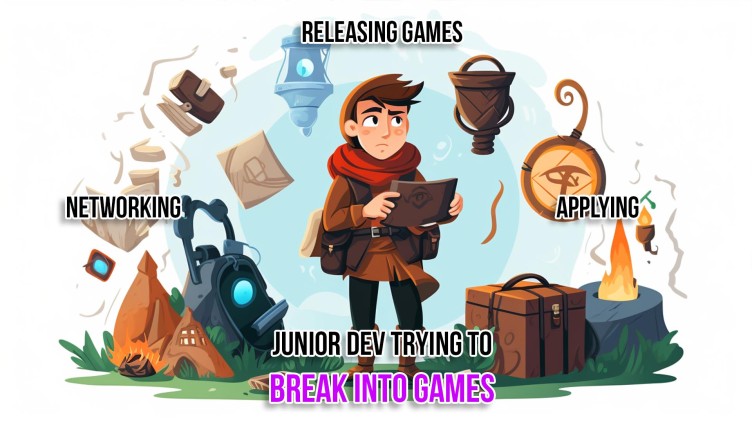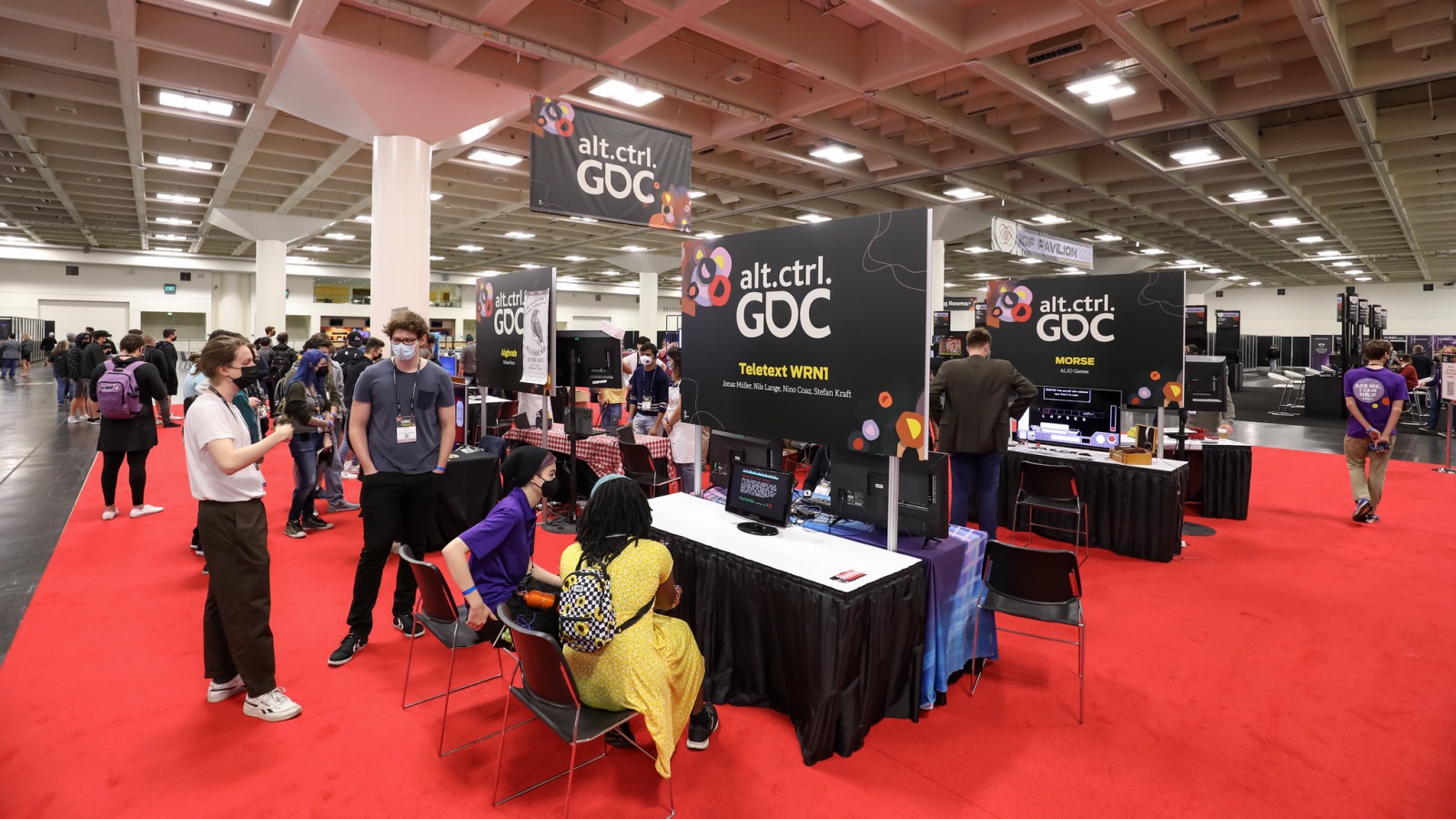Three Tips to help you Break Into the Game Industry

How do you break into the video game industry?
Greetings! If you’re reading this article, you are surely wondering how to make your way into the wonderful industry that is games. You also have no doubt seen and heard and perhaps experienced what a challenging place it is to break into.
Well! Never fear! My name is Willem Delventhal and I’m here to help you out. I’m a veteran game developer and designer and I also happen to run the Indie Game Academy, a gamified online school for game developers. Through our work there we have now helped over 3,000 students build games, many of them starting their own studios or joining existing ones. In addition, we’ve now interviewed over 100 industry experts on our podcast, including designers, recruiters and hiring managers, and we’ve noticed some trends in the advice they have to give.
What are those tips? Well! You’ve probably heard them all before! But we have some fresh perspectives and resources for you. We hope they act as the push you need to pave your own beautiful, gamey path.
So! Let’s begin! Here are the top three tips we have both seen and heard will help you break into the video game industry.
Continuously Build Your Portfolio

Fun fact! If you want to work in the game industry, you need to make games! (Who would have guessed?) Junior roles now expect you to to have a few released titles to your name, preferably to actual stores for actual dollars, to gain entry level jobs.
This can be a little frustrating and I totally get why. “Entry Level” sure does seem to imply that you don’t need anything to get started. But in an age with incredibly powerful tools, game engines and tutorials at your fingertips, there really is nothing stopping you from gaining experience without a job.
Nathan Kellman, a recent guest on our podcast, actually secured his first industry job in part because he essentially formed his own indie studio back in school. Him and a few friends started working on Mantra back in 2017. Now the project has 50+ people working on it, almost entirely on a volunteer basis, where everyone is just there to gain experience. Nathan went on to get hired at Lost Boys Interactive and contributed to friggen’ Diablo 4 of all things.
So yeah. Make Games!
Game jams are your friends on this one. Basically anyone can fit a quick game jam into a weekend. But of course the more time you devote, the better. CONSTANTLY work on personal projects. Try to keep them fun, but think of them too as showcases and practice exercises. Find team members you like (which is only done through trial and error) and hold them near and dear.
Once you have these games, put them in an attractive portfolio website that focusses on released titles and outlining how you contributed to them. Portfolios alone are stupid valuable, with hover.blog putting 71% of hiring managers defining them as “very important” for a candidate.
Here is a student of ours who has a simple, strong portfolio for you to copy from. Put up your best 3-5 games with a separate page that lists the rest, and continuously build new games and add the best to your portfolio site on a regular basis!
Ludum Dare is the most well recognized jam
The Global Gam Jam is beloved too
Itch.io has a bunch of great jams
Network Like Crazy

After some frankly depressing math from Amir Satvat, the sweetheart of the game industry, it has become clear that you have a less than 1% chance to land a job from a cold application. IE an application through an automated service like the company website or LinkedIn itself where nobody at the company refers you.
Up to 80% of game industry jobs are filled by referral. Basically, somebody who knows somebody who works at the company is vastly more likely to get the job than somebody who doesn’t. Every job I’ve ever had in games has been at least in part thanks to a referral.
Growing and tapping into your network is absolutely PIVOTAL to landing a job in games
Go to events, in person and online. Hand out business cards. When you meet somebody cool, ask for their contact info. Email them afterwords and offer to buy them a coffee, virtually or IRL. Ask for advice. Use LinkedIn to cold-call cool people and start a conversation. Then keep those connections alive.
Any time you apply for a job, especially one you’re keen for, I want you to come back to LinkedIn and find at least three 2nd or 1st connections who know somebody at the company. Ask them for an intro, and work your way in.
Meetup is great for in-person groups
Maybe find your local IGDA chapter
Apply Aggressively

And the last step. Assuming you now have a pretty solid looking portfolio and a strong network you can ask for help, I want you to go hard as absolute heck when actually applying for roles.
First, let’s talk volume. If you can, I want you to apply for a minimum of 10 jobs per week. And ideally, if you can handle it and find the jobs, I want you to apply for even more.
Track these jobs in a simple spreadsheet. Include progress, contact info, and any useful notes. Reach back out to these applications once a week until you get a definitive “yes” or “no.” When you do get a “no”, be thankful and polite, and ask for any tips or advice the recruiter may have. Ask them if you can reach back out to them in the future, and ask to be considered for future roles.
And yes, you need cover letters
When you do apply, always write a personalized cover letter. I have a formula where every one of my cover letters is three paragraphs long, and the first and third paragraphs are the generally same for every letter, meaning I only need to write a few sentences for the second paragraph per application.
Join the Discord/community space of studios you really want to work for and become a valuable community member. See if you can’t get some chat time with devs. Work. Your. Way. In. Be persistent, and try to enjoy the entire process.
Oh and one last thing, consider working outside of games first. Nobody wants to hear that, but if you can work especially in tech in the same or similar role you would work in games, this makes you a better candidate for future games jobs.
Oftentimes it is those who are unrelenting that get the job. Here are a few places to find roles:
Amir Satvat’s Games Jobs Directory
And there you have it

There you have it. Three things you can do right this instant to increase your odds of breaking into games, even during these crazy days.
Join a game jam or two to build some high quality, portfolio games. Once you find a few people you like, pick the best and build a few long form games with them, 2-4 months each. Then put the top 3-5 finished, released games on an attractive portfolio.
Network with cool people and ask for their advice and their help. Be humble and grateful, but be persistent.
And finally, don’t wait, apply now, and apply aggressively.
I wish you well on your journey, dear adventurer. Follow me here if you want more optimistic game dev content, and future tips.
Your forever Gandalf,
Willem



